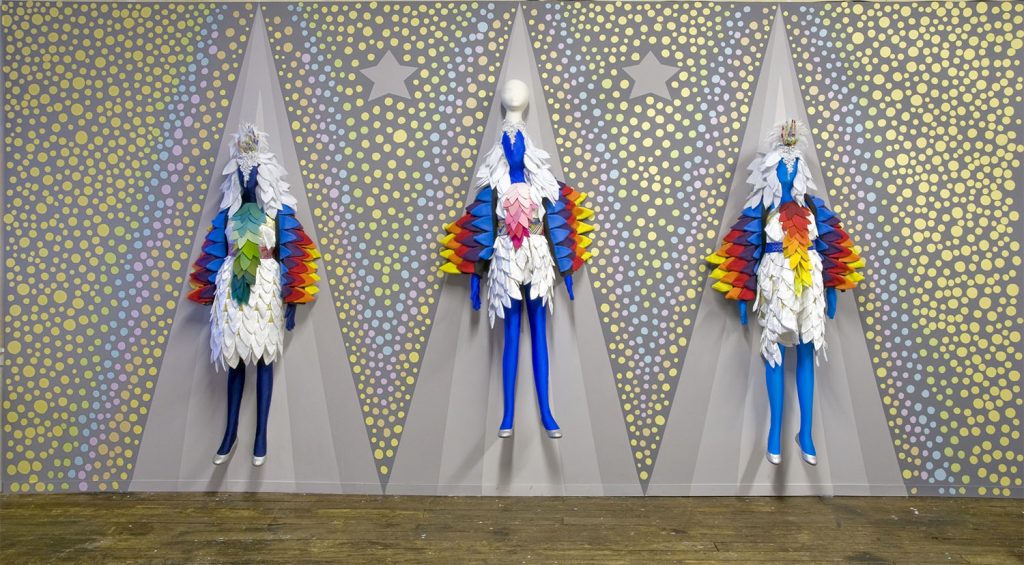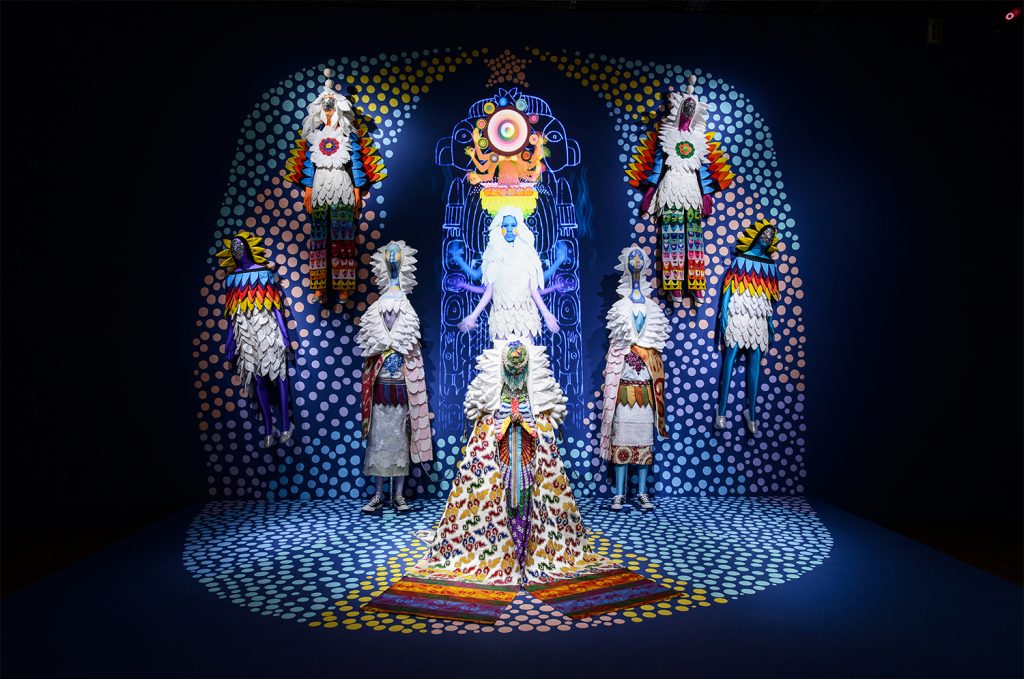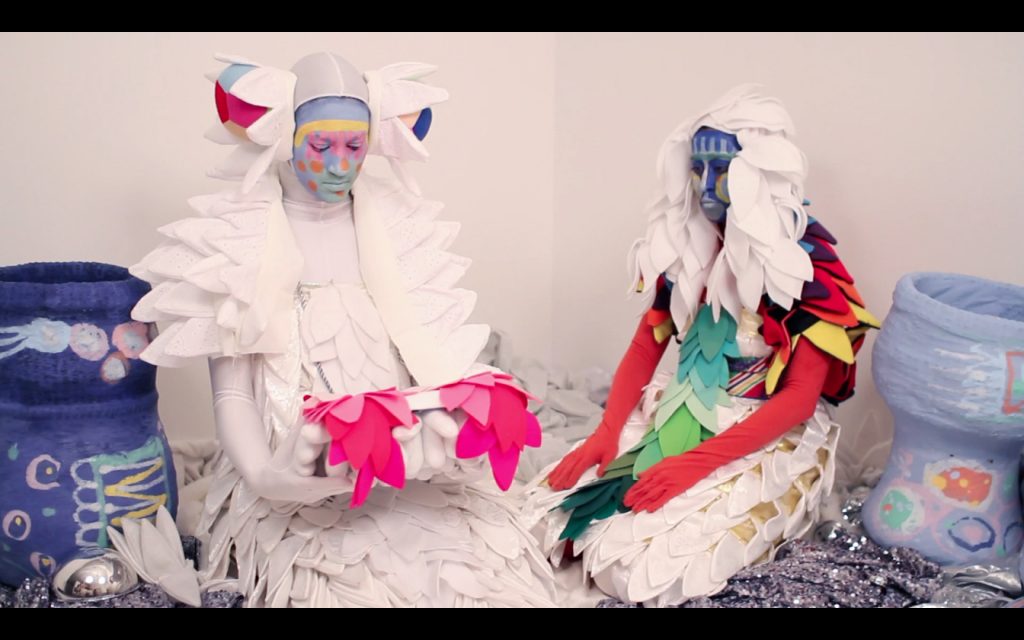Frontiers Augmented highlights selected authors from our issues to create a means for deeper engagement with the content published in the Frontiers Journal. The most recent issue, Staging Feminist Futures 41.3, a special issue edited by Frontiers Co-Editor Kimberly M. Jew, brings together feminist and queer visions of the future as expressed in performance. With this issue, we highlight two authors, Marjorie Maddox and Anna M. Moncada Storti.
From the general collection, Marjorie Maddox Hafer, Professor of English and Creative Writing at Lock Haven University, published Four Poems under pen name Marjorie Maddox, “Age-Based Connotations”, “In the Company of Women”, “Pro-Choice”, and “Re-Vision”. In Frontiers Augmented we present “Hyphen”, a fifth poem as part of her collection with Frontiers.
To supplement her article titled “Scenes of Hope, Acts of Despair Deidealizing Hybridity in Saya Woolfalk’s World of the Empathics,” Anna M. Moncada Storti, offers a colorful description and images of the work of performance, visual and film artist Saya Woolfalk.
Marjorie Maddox
Hyphen
And in the on-line photo you Googled in a split-
second of nostalgia before re-
filling your cup of cold coffee in the middle of grading half-
assed and in-
accurate freshman essays about love, your ex-
lover, once so gallant and handsome in his pre-
abuse days, now poses half-
in/half-
out of the framed, somewhat professional-
looking ad for brain-
health, and he is (can it be, the one-who-finally-stopped-barging-
into-your-dreams with his semi-
cocked, alluring grin; yes, him) is huge—as in bigger-
than-the-cave-he-carved-beneath-your-
ribs huge—and you can’t quite recognize his just-
opened eyes that saw you for you in those before-
dawn moments when you curled slimly into him with no hyphens
to link you together, no selfies, no Google, no on-
line evidence that this “love” even your oldest students try-try-
fail to define defines you or raises its hand to pretend-
describe the nameable part of your-
self that is now, thirty years later, new names with-
out hyphens, without definitions, with-
out, without.
And yet—
you are happy to be not-
happy or at least not un-
happy to be surprised somewhat-
happy at this not-quite-but-almost-
turn into memory, into the strange world of then-
and-now, with now better after-
all, at least today when your un-
tanned, pale suburban leg falls asleep as you are slow-
typing this, but is finally fast-waking
into a morning where it is time for more fresh-
ground, bitter-
sweet coffee that you can, with now-
awake limbs, amble to the re-
modeled kitchen and refill the chipped cup as your not-
new love looks up from the paper, rises in his most-
ordinary of ways, and smiles—
just like that—no dash, not even half
a hyphen in his eyes
as he offers to warm what you have.
Anna M. Moncada Storti
Watching the Future Closely
I have sought their future world for as long as I can remember. I don’t know anymore if I made no place or if I found no place, or found traces of it at least. We hold on in the promise that these bones, these fragments of a world are from that world. And we will hold on offering our own rituals. A commixture of human rituals present and past in the desperate hope that word might become flesh or that it always was, always will be. In the desperate hope that we might meet this world we offer human tokens.
excerpt from No Place: A Ritual of The Empathics
These words sow the seeds of Empathic life, a gesture to hybrid living and an invitation to join. Put forth by contemporary artist Saya Woolfalk, the Empathics are part-plant part-human creatures who co-exist in three temporal settings: the present, the future, and the future-future. Through each moment in time, the hybrids practice a form of communal living that brings the issue of mixture to bear on feminist futures, troubling the racialized scripts of hybridity all the while.
A messy concept rooted in biology, hybridity is sometimes regarded as racism’s antidote. We know how the logic goes: if we mix with the other, race will no longer separate, but bring us together, as one. Some call this progress, others know the truth. In a way, the same logic can be applied to the concept of empathy: we’re told that once we empathize with someone, we narrow the gap that difference creates. This is not enough, the Empathics warn. The idealized sentiments of hybridity and empathy may stem from good intentions, yet in a moment like ours, I can not help but wonder: how might a reach towardsoneness already thwart our ability to face the cautionary desires that continue to incite even our most desperate of hopes?
I source answers through Woolfalk’s multispecies world, which began in 2008 when she joined forces with anthropologist and documentary filmmaker Rachel Lears to create a series of ethnographic videos. A travel narrative, No Place: A Ritual of The Empathics instills an affective engagement with a world other than ours. It was performed at the Harlem Studio Museum on November 14, 2009 and a recording is available online. When I watch closely, I forget the day, the month, the year and enter a world without time, obscure enough so that my vision blurs and I, too, am performing a ritual. Like many of our experiences these days, this ceremony begins with a screen. The blue light forces focus. Soon, I must turn away for a break. No Place sounds the alarm. As I watch, a woman not unlike me touches a technicolored skeleton, blooming into something new. Defiance. I am awakened to an attachment to structure—taxonomy; to a desperate hope for a world I think will be better.
In our moment of global pandemic especially, Woolfalk helps me cohere my scattered attempts to make sense of time, which is simply a calculus showing how bodies live on uneven axes. The artist’s use of color, textile, and tone animates a childlike aesthetic, conjuring an elsewhere that was once familiar, but is now no more than a fleeting memory.
We hold on.
In the desperate hope.
When I listen to the Empathics’ words, I no longer find myself asking, “What day is it?” Instead, I ask, “Where are we going?”
Opening the Empathics’ invitation, I uncover a clue, which is to say, a desperate hope for a feminist future built not on the basis of hybridity or empathy, but in being held, in longing to touch and be touched. This is a future that is present. Always fraught. There is rebellion, there will be abolition. I hold on to a feminist desire for a world that opens us up to life’s chances insofar as one’s access to that world demands resistance to the forces that continue to harm all forms of life, even those awaiting in the future.



Frontiers Special Issue Staging Feminist Futures 41.3 Edited by Kimberly M. Jew Ph.D.
